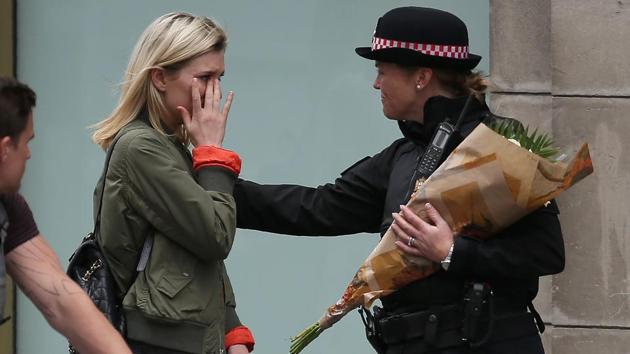Policing by consent: The reassuring face of the British police in trying times
The philosophy underpinning policing in Britain is often seen in practice, when members of the public do not hesitate to approach policemen. In this unique model, police officers are seen as citizens in uniform – they exercise their powers to police their fellow citizens with the implicit consent of their fellow citizens.
As London woke up on sunny Sunday to the terror attack that killed seven people, plumber Paul Ashworth picked up his cycle in Surrey and rode to the scene of the attack, 35 km away. He was carrying a bag containing water bottles. All he wanted to do was to go and give them to the police deployed on the scene in gratitude: “I’ve just come to give the police some cold water. It’s nothing in comparison to what they do. It’s just to try and give something back. They’re protecting us, saving our lives”.

Others like Paul approached policeman on the terror scene just to shake their hands, without a word being exchanged. There were many such small acts by members of the public on Sunday as well as on March 22, when six people were killed on the Westminster Bridge. It is not only the speed at which the Greater Manchester Police identified the suicide bomber on May 22, or the eight minutes in which Scotland Yard arrived on London Bridge on Saturday night and neutralised the three assailants. It is the easy, friendly, sometimes humorous interaction between members of the public and the police in the United Kingdom that deserves some attention.
Questions will be asked of the police and intelligence agencies about the terror attacks, but at the heart of this police-public relationship is the idea of ‘policing by consent’ and the nine principles of policing first issued in 1829 when Robert Peel was the home secretary. To an Indian visitor, it is something of a surprise to see policemen, even those with formidable-looking firearms, smiling and having a relaxed conversation with tourists and onlookers outside the entrance to 10, Downing Street, often addressing them as ‘Sir’. In IT parlance, if firepower, technology, commando tactics and other attributes of policing is the ‘hardware’, it is the remarkable ‘software’ of police-public interaction that comes to the fore during such times of terror.
The theory and philosophy underpinning policing in Britain is often seen in practice, when members of the public do not hesitate to approach policemen. In this unique model, police officers are seen as citizens in uniform – they exercise their powers to police their fellow citizens with the implicit consent of their fellow citizens. ‘Policing by consent’ denotes that the legitimacy of policing in the eyes of the public is based upon a general consensus of support that follows from transparency about their powers, demonstrating integrity in exercising those powers and their accountability for doing so.
The nine principles include the idea to “seek and preserve public favour, not by pandering to public opinion; but by constantly demonstrating absolutely impartial service to law, in complete independence of policy, and without regard to the justice or injustice of the substance of individual laws, by ready offering of individual service and friendship to all members of the public without regard to their wealth or social standing, by ready exercise of courtesy and friendly good humour; and by ready offering of individual sacrifice in protecting and preserving life”.
Every new police officer is also told to “maintain at all times a relationship with the public that gives reality to the historic tradition that the police are the public and that the public are the police, the police being only members of the public who are paid to give full time attention to duties which are incumbent on every citizen in the interests of community welfare and existence”. As the historian Charles Reith noted in his ‘New Study of Police History’, this philosophy of policing is “derived not from fear but almost exclusively from public co-operation with the police”, through behaviour that “secures and maintains for them the approval, respect and affection of the public”.
It is seen to refer to the power of the police coming from the common consent of the public, as opposed to the power of the state. When police officer Keith Palmer was killed during the Westminster Bridge attack, it evoked public outpouring of grief and support to his family, and live media coverage of his funeral.
Policing models across the world may be based on lofty principles, but are rarely seen to be translated in practice as they are in the United Kingdom. Britons have a lot to complain about their country, and often do so unreservedly, but their policing and the philosophy behind it is something most are proud of – and holds a reference point to India and others in these times of terror.
Prasun.Sonwalkar@hindustantimes.com




